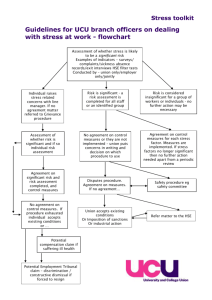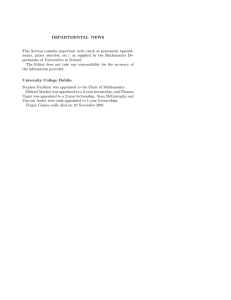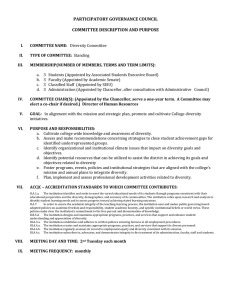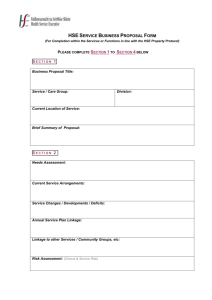Appointed Doctor Audit Form
advertisement
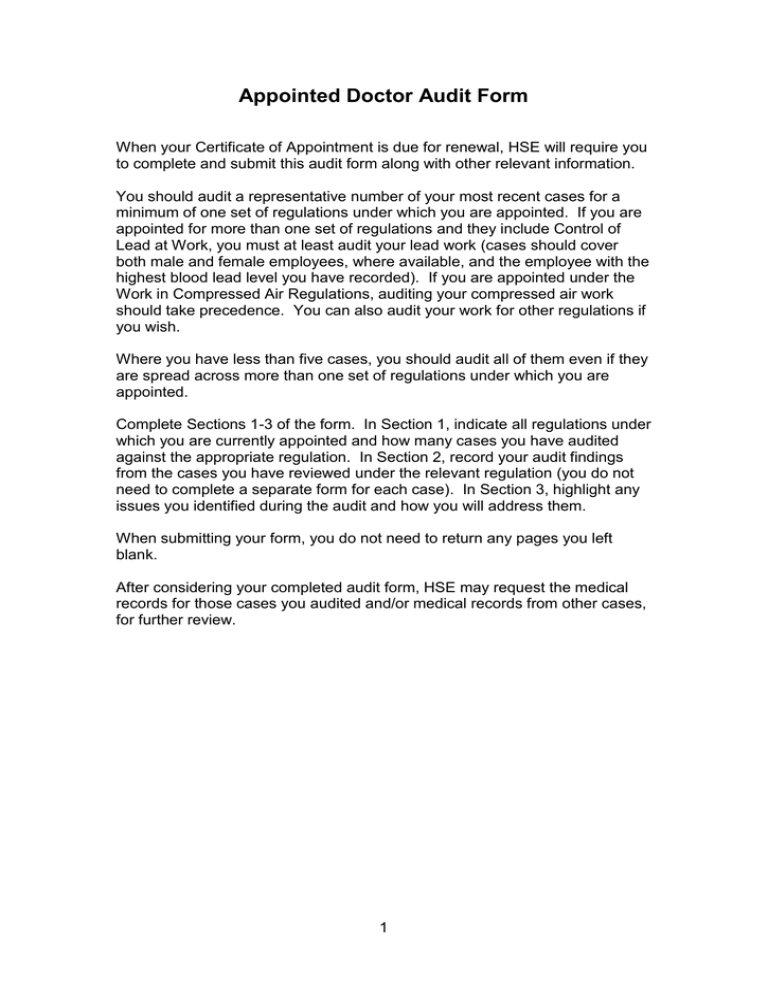
Appointed Doctor Audit Form When your Certificate of Appointment is due for renewal, HSE will require you to complete and submit this audit form along with other relevant information. You should audit a representative number of your most recent cases for a minimum of one set of regulations under which you are appointed. If you are appointed for more than one set of regulations and they include Control of Lead at Work, you must at least audit your lead work (cases should cover both male and female employees, where available, and the employee with the highest blood lead level you have recorded). If you are appointed under the Work in Compressed Air Regulations, auditing your compressed air work should take precedence. You can also audit your work for other regulations if you wish. Where you have less than five cases, you should audit all of them even if they are spread across more than one set of regulations under which you are appointed. Complete Sections 1-3 of the form. In Section 1, indicate all regulations under which you are currently appointed and how many cases you have audited against the appropriate regulation. In Section 2, record your audit findings from the cases you have reviewed under the relevant regulation (you do not need to complete a separate form for each case). In Section 3, highlight any issues you identified during the audit and how you will address them. When submitting your form, you do not need to return any pages you left blank. After considering your completed audit form, HSE may request the medical records for those cases you audited and/or medical records from other cases, for further review. 1 SECTION 1 – DETAILS OF APPOINTMENT Name of Appointed Doctor ___________________________________ PIN number _____________________ Regulation Tick all regulations under which you are currently appointed Control of Asbestos Ionising Radiations Control of Lead at Work COSHH Work in Compressed Air Date audit completed _____________________ Signature ___________________________________ 2 Number of cases audited SECTION 2 – AUDIT FINDINGS Control of Asbestos Regulations AUDIT YES Are you familiar with the following? HSE’s Appointed Doctor web pages Guidance for Appointed Doctors on the Control of Asbestos Regulations Relevant Approved Code of Practice Appointed Doctor eBulletins issued periodically by HSE Have you visited the workplace to familiarise yourself with the activities to which the regulations apply, the conditions in the workplace and the workers under medical surveillance? Do you provide an original Certificate of Medical Examination to both the employee and employer? Do your clinical notes contain the following information? Name Address NI number Date of birth GP’s name and address Occupational and exposure history, including previous exposure to asbestos or other fibre/dust Medical history, including previous respiratory disease Smoking history Record of advice on the additional risks of smoking Respiratory symptom questionnaire Clinical examination of the respiratory system %FEV1 and %FVC of predicted, FEV1/FVC ratio Where you have obtained a PA chest X-ray, evidence it was justified on individual clinical grounds An initial medical examination not more than two years before starting exposure Periodic medical examinations every two years or less 3 NO Ionising Radiations Regulations AUDIT YES Are you familiar with the following? HSE’s Appointed Doctor web pages Guidance for Appointed Doctors on the Ionising Radiations Regulations Relevant Approved Code of Practice Appointed Doctor eBulletins issued periodically by HSE Have you visited the workplace to familiarise yourself with the activities to which the regulations apply, the conditions in the workplace and the workers under medical surveillance? Do you know how to contact the Radiation Protection Adviser, if necessary? Are you aware of the need to immediately contact HSE via appointed.doctor@hse.gsi.gov.uk, in the event of an overexposure? Do your clinical notes contain the following information? Name Address NI number Date of birth GP’s name and address Job description Occupational and exposure history, including previous exposure to IR (occupational, diagnostic, therapeutic) or carcinogens (eg asbestos, cytotoxic drugs) Medical history Smoking history Review of dose records Review of sickness absence Statement of fitness Relevant findings and a documented rationale supporting a decision of fitness/unfitness Evidence that fitness for work has been communicated to the employee and employer An initial medical examination not more than 12 months before first being designated as a classified person Periodic review of health every 12 months or less, including annual face-to-face reviews where appropriate 4 NO Control of Lead at Work Regulations AUDIT YES Are you familiar with the following? HSE’s Appointed Doctor web pages Guidance for Appointed Doctors on the Control of Lead at Work Regulations Relevant Approved Code of Practice Appointed Doctor eBulletins issued periodically by HSE Have you visited the workplace to familiarise yourself with the activities to which the regulations apply, the conditions in the workplace and the workers under medical surveillance? Have you given workers advice on eating, drinking and smoking in relation to the potential for lead ingestion? Have you given workers advice on hand washing and storage of clothes? For blood leads, do you use a laboratory included in HSE’s list? www.hse.gov.uk/lead/surveillance.htm Do you monitor trends in blood lead levels? Are you aware that if an employee working with lead reaches the suspension level, you should alert HSE within seven days of certifying the employee as unfit via appointed.doctor@hse.gsi.gov.uk? Do your clinical notes contain the following information? Name Address NI number Date of birth GP’s name and address Occupational and exposure history Medical history Smoking status Clinical examination (personal hygiene, nail biting etc) Evidence that blood lead (and urinary lead for lead alkyls) is checked at the appropriate frequency set out in the ACOP Record of other tests (eg haemoglobin, ZPP) where relevant Consent to disclose biological test results to the employer Statement of fitness Relevant findings and a documented rationale supporting a decision of fitness/unfitness Evidence that fitness for work has been communicated to the employee and employer An initial medical examination before starting exposure for the first time or within 14 days of starting such exposure Periodic medical examinations every 12 months or less 5 NO Control of Substances Hazardous to Health Regulations AUDIT YES Are you familiar with the following? HSE’s Appointed Doctor web pages Guidance for Appointed Doctors on the Control of Substances Hazardous to Health Regulations Relevant Approved Code of Practice Appointed Doctor eBulletins issued periodically by HSE Have you visited the workplace to familiarise yourself with the activities to which the regulations apply, the conditions in the workplace and the workers under medical surveillance? Do your clinical notes contain the following information? Name Address NI number Date of birth GP’s name and address Occupational and exposure history Medical history Smoking status Substances to which the worker is exposed, with dates if intermittent Clinical examination Results of any biological monitoring Statement of fitness Relevant findings and a documented rationale supporting a decision of fitness/unfitness Evidence that fitness for work has been communicated to the employee and employer An initial medical examination before starting exposure Periodic medical examinations every 12 months or less Vinyl chloride monomer Do your clinical notes contain the following information? Clinical assessments with particular reference to the abdomen, skin and extremities Where you have obtained an X-ray or other tests, evidence they were justified on individual clinical grounds Nitro or amino derivatives of phenol and of benzene or its homologues Do your clinical notes contain the following information? Evidence the examination is aimed at detecting haematological effects such as methaemoglobinaemia, clinical cyanosis, and jaundice and/or haemolytic anaemia Findings of the examination, which should normally include measurement of haemoglobin and, if clinically indicated, methaemoglobin and any other haematological tests as 6 NO required to confirm anaemia Potassium or sodium chromate or dichromate Do your clinical notes contain the following information? Details of skin and nasal inspections for chrome ulcer and nasal septum perforation Outcome of enquiries about respiratory symptoms (lung cancer) Findings of clinical examination of the respiratory system Where you have obtained a chest X-ray, evidence it was justified on individual clinical grounds Ortho-tolidine and its salts, dianisidine and its salts, dichlorobenzidine and its salts, auramine and magenta Do your clinical notes contain the following information? Outcome of enquiries about symptoms of urothelial neoplasia Results of urinalysis, seeking evidence of haematuria, if clinically justified Results of urinary cytology, if conducted Carbon disulphide, disulphur dichloride, benzene including benzol, carbon tetrachloride and tricholoroethylene Do your clinical notes contain the following information? Evidence that the worker has been examined for the relevant health effects For trichloroethylene, result of urinary trichloroacetic acid, if measured, as an indicator of absorption Pitch Do your clinical notes contain the following information? Outcome of skin inspection for pitch wart and malignancy A record that suspicious lesions have been referred to a dermatologist and the outcome Evidence of three-monthly surveillance where there is doubt that an employee will carry out self-examination 7 Work in Compressed Air Regulations AUDIT YES Are you familiar with the following? HSE’s Appointed Doctor web pages Guidance for Appointed Doctors on the Work in Compressed Air Regulations Relevant guidance from the British Tunnelling Society/ Compressed Air Working Group Appointed Doctor eBulletins issued periodically by HSE Have you visited the workplace to familiarise yourself with the activities to which the regulations apply, the conditions in the workplace and the workers under medical surveillance? Do your clinical notes contain the following information? Name Address NI number Date of birth GP’s name and address Occupational and exposure history, including the working pressure Medical history Smoking status Clinical examination Where you have obtained an X-ray, evidence it was justified on individual clinical grounds Evidence of assessment of continuing fitness for compressed air work Statement of fitness Relevant findings and a documented rationale supporting a decision of fitness/unfitness Evidence that fitness for work has been communicated to the employee and employer An initial medical examination before starting exposure Periodic medical examinations every 12 months or less 8 NO SECTION 3 – OUTCOME OF AUDIT From auditing your medical records, what issues have you identified and how will you address them? 9
